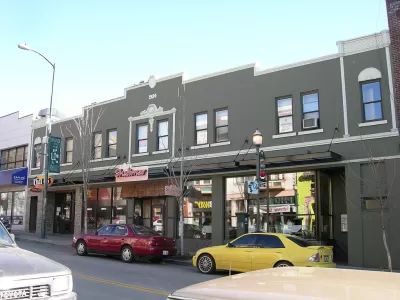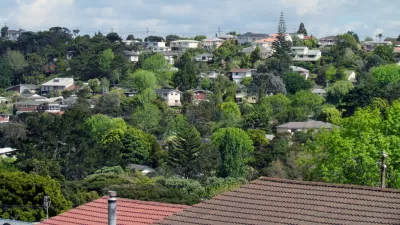The corridor along University Way is currently exempt from the wave of upzoning implemented by the city's Mandatory Housing Affordability program, but that exemption is only temporary.

The city of Seattle is debating the future of University Way, know locally as The Ave, as pressures from investments enabled by the city's Mandatory Housing Affordability (MHA) program have raised alarms with local residents and officials. Natalie Bicknell reports on the debate surrounding the zoning of the corridor.
"The Ave, which is one of the most pedestrian-friendly commercial districts in Seattle, lies right in the heart of the University District urban village, one of the first urban villages to be upzoned under MHA back in 2017–although The Ave was taken out of the upzone following community pushback," explains Bicknell for the backstory on the debate.
In a particular contentious election climate, District 4 City Council candidates Shaun Scott and Alex Pedersen have waded into he debate by agreeing on opposition to any plan that would upzone the corridor, and a neighborhood group called Save The Ave "scored a second win this spring when it convinced the City Council to extend the exemption for The Ave during the citywide rollout of MHA."
"However, the exemption continues to be temporary, and the City is now preparing for a Supplemental Environmental Impact Statement (SEIS) that will study the potential impacts of upzones on the area," according to Bicknell.
The article includes the ideas for changing the zoning of the corridor currently being circulated by a public engagement survey connected to the SEIS process.
FULL STORY: City Contemplates Upzoning or Downzoning The Ave

Planetizen Federal Action Tracker
A weekly monitor of how Trump’s orders and actions are impacting planners and planning in America.

Maui's Vacation Rental Debate Turns Ugly
Verbal attacks, misinformation campaigns and fistfights plague a high-stakes debate to convert thousands of vacation rentals into long-term housing.

Restaurant Patios Were a Pandemic Win — Why Were They so Hard to Keep?
Social distancing requirements and changes in travel patterns prompted cities to pilot new uses for street and sidewalk space. Then it got complicated.

In California Battle of Housing vs. Environment, Housing Just Won
A new state law significantly limits the power of CEQA, an environmental review law that served as a powerful tool for blocking new development.

Boulder Eliminates Parking Minimums Citywide
Officials estimate the cost of building a single underground parking space at up to $100,000.

Orange County, Florida Adopts Largest US “Sprawl Repair” Code
The ‘Orange Code’ seeks to rectify decades of sprawl-inducing, car-oriented development.
Urban Design for Planners 1: Software Tools
This six-course series explores essential urban design concepts using open source software and equips planners with the tools they need to participate fully in the urban design process.
Planning for Universal Design
Learn the tools for implementing Universal Design in planning regulations.
Heyer Gruel & Associates PA
JM Goldson LLC
Custer County Colorado
City of Camden Redevelopment Agency
City of Astoria
Transportation Research & Education Center (TREC) at Portland State University
Jefferson Parish Government
Camden Redevelopment Agency
City of Claremont





























